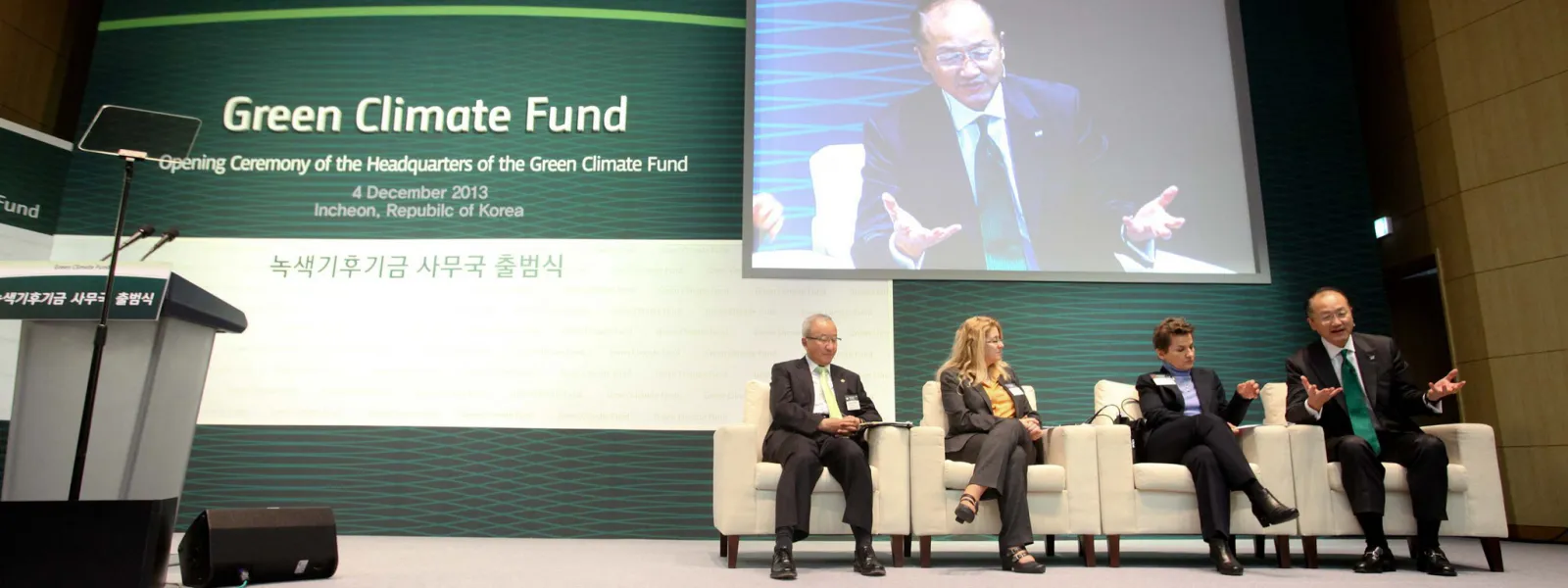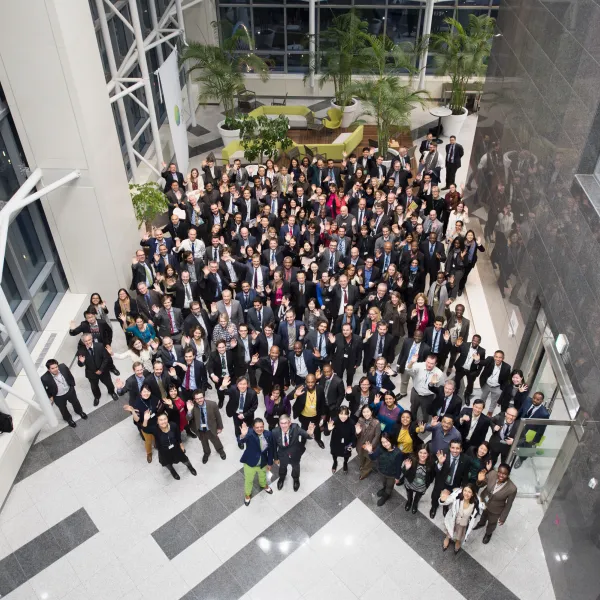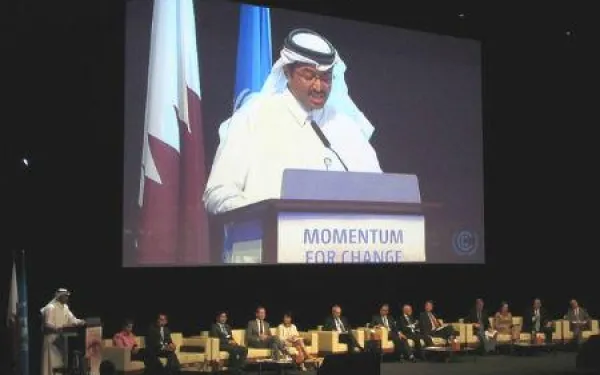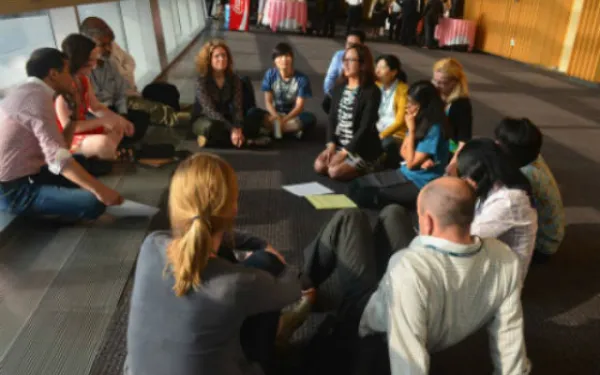
Project
Photo: GCFAdvocating before the Green Climate Fund
The Green Climate Fund is the world's leading multilateral climate finance institution. As such, it has a key role in channelling economic resources from developed to developing nations for projects focused on mitigation and adaptation in the face of the climate crisis.
Created in 2010, within the framework of the United Nations, the fund supports a broad range of projects ranging from renewable energy and low-emissions transportation projects to the relocation of communities affected by rising seas and support to small farmers affected by drought. The assistance it provides is vital so that individuals and communities in Latin America, and other vulnerable regions, can mitigate greenhouse gas emissions and address the increasingly devastating impacts of global warming.
Climate finance provided by the Green Climate Fund is critical to ensure the transformation of current economic and energy systems towards the resilient, low-emission systems that the planet urgently needs. To enable a just transition, it’s critical to follow-up on and monitor its operations, ensuring that the Fund effectively fulfills its role and benefits the people and communities most vulnerable to climate change.
Reports
Read our recent report "Leading participatory monitoring processes through a gender justice lens for Green Climate Fund financed projects" here.
Partners:

Related projects
Latest News

Can COP19 move the Green Climate Fund closer to reality?
By Andrea Rodríguez, AIDA's legal advisor, and Marcus Pearson, AIDA's volunteer (article published in Respond/RTCC Magazine) The Green Climate Fund was created as an effective response to the impacts of climate change by channeling financial resources from developed to developing countries. Will this happen? The Conference of the Parties in November will provide an opportunity for developing countries to lobby for significant financial commitments from the developed world to ensure the long-term viability of the GCF. The Green Climate Fund (GCF) was created in 2010 at the 16th Conference of the Parties (COP16) to the United Nations Framework Convention on Climate Change (UNFCCC). Its mission is to channel public and private financial resources to developing countries to help them mitigate and adapt to the impacts of climate change through low-emission and climate-resilient programs. But nearly four years later, the GCF has yet to disburse any funds. The GCF board has held four meetings with only limited results. At the first meeting in Geneva in August 2012, the board selected two interim co-chairs: Mr. Zaheer Fakir of South Africa and Mr. Ewen McDonald of Australia. It also formed committees, designated the World Bank as Interim Trustee, and agreed to invite observer organizations to participate, albeit in a restricted capacity. A lack of consensus stalled decisions at the October 2012 meeting in South Korea, where the only notable motion was making Songdo, South Korea the GCF’s headquarters. More advances came at the February 2013 meeting in Berlin. The board adopted procedural rules to govern its actions, regulate board member selection and define the participation and role of civil society observers. This laid the groundwork for the GCF to carry out its mission. At the June 2013 meeting in South Korea, the board then discussed the GCF’s business model framework (BMF) and the policies, guidelines and organizational structures needed to commence operations. The board also chose the governance structure of the private sector facility (PSF) [i] and appointed Ms. Hela Cheikhrouhou of Tunisia as executive director of the GCF Secretariat. The fifth meeting in Paris could address the many outstanding issues still needed to bring the GCF into effective operation. To do so, the Board must overcome its perceived ineffectiveness. Civil society concerns Civil society organizations (CSOs) are concerned about the GCF’s decision-making process and future. Perhaps the greatest issue is the uncertainty of funding. The GCF board has started to identify project areas and define criteria to allocate resources, but developed countries have yet to pledge meaningful funds. Concrete commitments are essential to ensuring the availability of predictable resources needed to achieve long-term results to mitigate and protect against the impacts of climate change. CSOs also fear that a lack of transparency and accountability will hamstring the GCF. Transparency does not seem to be a priority for the board. For example, the board has decided against webcasting its meetings even though the UNFCCC commonly does so, helping to cut costs and carbon emissions associated with travel. If the GCF already broadcasts meetings to observers in an overflow room, why not webcast? CSOs fear the board does not want to make its meetings open to the public. Lack of public accountability remains a concern particularly because of the small opportunity given to civil society to participate in the decision- making process. The GCF will mobilize financial resources from both public and private sectors, and civil society oversight is needed to ensure that policies do not respond to the investment interests of the private sector but to the needs of the most vulnerable. Moreover, the board is not granting CSOs meaningful opportunities for participation. The GCF publishes documents before meetings without sufficient time for many CSOs to review and comment on proposals[ii]. Meanwhile, only two CSO representatives may actively participate at board meetings in person and even so may not be allowed to talk or approach board members[iii]. These practices call into question the GCF’s legitimacy. Globally, CSOs play a vital role in developing climate change policy by informing decision makers about local issues and needs, and by providing examples of best practices for resource allocation. Given that the GCF stresses accountability in its mandate, CSOs should have access to government representatives and information in open and transparent meetings. COP19: An opportunity for the GCF? The COP19 this November in Warsaw will show the world whether the GCF can become an effective engine for climate change funding in developing countries. At this conference, developing countries must seek firm financial commitments for climate adaptation and mitigation. Only guaranteed funding will enable the board to make effective decisions regarding resource distribution or provide developing nations with a clear picture of how much funding is available. The GCF Board must also seek -- and receive -- guidance because many COP attendees will benefit from GCF resources. Countries can use the COP to provide advice on GCF policies, share their priority needs for funding, and recommend criteria to guarantee access to resources. The COP will also give CSO representatives a chance to raise questions and highlight counterproductive practices. Conclusions The COP presents a prime opportunity for developed nations to commit to the GCF’s stated goals and pledge desperately needed financing. Parties and CSOs must use the COP – GCF’s monitoring body – as a tool to improve GCF accountability, inclusivity and transparency so that the GCF can truly work to benefit vulnerable populations in developing countries. The COP should be a benchmark for advancing the GCF rather than just another event for developed countries to congratulate themselves on timorous steps forward. [i] The PSF will enable the GCF to directly and indirectly finance private sector mitigation and adaptation activities at the national, regional and international level. [ii] For the June meeting in South Korea, documents were published less than two weeks before the meeting, rather than 21 days as outlined in the additional rules of procedure decision taken in Berlin. [iii] As was the case on the last day of the meeting in Songdo.
Read more
Letter to the Board of the Green Climate Fund
Organizations, movements and civil society groups from developing countries -with decades of experience working for the rights and aspirations of peoples and communities- express their unified call for the adoption of the most robust environmental and social protections at the Green Climate Fund.
Read more
"No thank you" says the Green Climate Fund Board to transparency and civil society input
By Andrea Rodríguez, legal advisor, AIDA,@arodriguezosuna Once again civil society organizations expressed disappointment at the lack of transparency and civil society engagement at the latest meeting of the board of the Green Climate Fund (GCF), an operating entity of the United Nations Convention Framework for Climate Change (UNFCCC). The 24-member board met June 25-28 in Songdo, South Korea to further advance a process of putting the GCF into operation. The GCF will operate as a mechanism for transferring funds from the developed to developing world in order to help developing countries finance adaptation and mitigation practices to combat climate change. Civil society organizations have been constantly asking the GCF board for better opportunities for civil society to effectively be involved in the GCF decision-making process. Organizations have sent letters to board members, advisors and the GCF Interim Secretariat. But these many attempts to draw attention and consideration to civil society’s concerns have come to no avail. The board has constantly closed the doors to civil society’s active and effective participation. At board meetings, civil society may only have two active observers in the meeting room: one representing the north and the other the south. The other accredited observers have to sit in an overflow room to watch the meeting. The two active observers may only engage in the meeting if invited by the co-chairs of the board. Only one intervention can be made per each agenda item of the meeting and for no more than three minutes each time. On the last day of the Songdo meeting, the co-chairs disallowed any interventions from civil society, claiming there was not enough time. Ironically, the most important decisions were made on the last day. Given these limitations imposed by the co-chairs, the two active observers in the meeting room approached several board members to share key points on different papers from the perspective of civil society. The co-chairs, however, penalized this action and forbade the active observers from talking to board members. Despite the frustration of the being undermined and excluded, civil society was hoping to win at least one battle at the meeting: getting the board to decide in favor of live webcasting. Live webcasting shows a commitment to accountability and transparency. It provides opportunities for people without the resources to travel to board meetings to get involved in the meeting while also limiting the CO2 emissions generated by each board meeting through a reduction in the number of international flights taken for attendance. Webcasting is widely used by climate-related funds and is even used by the UNFCCC, the international environmental treaty of which the GCF is part. In Songdo, the GCF board decided against live webcasting on the argument that it would be too expensive at US$20,000 to US$30,000 per meeting. The board’s reference prices, however, are far more than the market average of US$1200 per day. According to the Adaptation Fund (AF) Secretariat and its webcast provider, live-streaming of AF board meetings costs about $1,000-$1,250 per day of broadcast, depending on site specific issues. Instead of live webcasting, the GCF board agreed to make webcasts of the meeting accessible three weeks after the event upon registration. Civil society organizations believe that this three-week delay prohibits organizations from advocating on the issues related to the discussions and decisions at the meeting. The Green Climate Fund has decided to have a strategic focus on climate mitigation and adaptation and seek to maximize sustainable development. Nevertheless, it is difficult to understand how the fund would ever be able to maximize “sustainable development” if its decisions are not made with the support of effective stakeholder participation and engagement throughout the whole process.
Read more